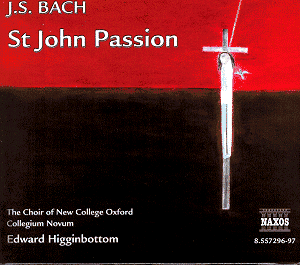This new recording of Bach's second great passion,
after the monumental St. Matthew Passion, must be examined in
the light of an important choice made by Edward Higginbottom:
that of using all male voices as soloists and in the choir. While
proponents of historically informed performances have long suggested
such forces, few have actually used them. Gustav Leonhardt and
Nicholas Harnoncourt used only male voices in their cantata series,
but not in the passions that they have directed. The opening chorus
here takes on a much different texture with a certain weakness
in the mid-range; the bass and tenor voices are strong, the sopranos
somewhat sharp, but the altos are lost in the crowd.
But what may sound unattractive at first listening
may grow on the listener. I found repeated listenings, after I
got used to this sound, to be much more satisfying than the first
time I heard the recording. Higginbottom's choir has an attractive
texture, even though it sounds weak at times. This is far from
the resplendent choir in the excellent recording by the Bach Collegium
Japan, led by Masaaki Suzuki, where every voice resounds. The
Choir of New College Oxford sounds less like a "concert" choir
and more like a "church" choir. The restrained forces (a maximum
of 28 musicians) combine well with the voices in the larger movements.
But when the choir needs to sound forceful it doesn't always come
through strongly enough. The second number of this passion, which
calls for the choir to sing forth with great emotion, sounds far
too "light". But all in all, the choir is quite good, showing
a good mastery of the subtle dynamics required for this work.
But the use of boy soloists is less successful.
Soprano Joe Littlewood just doesn't do it. He is neither convincing
nor proficient enough. This is no fault of his; I have nothing
but respect for someone his age who can take on such a demanding
role.
One surprise on this recording is the excellent
performance of James Bowman, unfortunately for just two numbers:
Von den Strikken meiner Sunden, in Part II, and Es is vollbracht
in Part II. Bowman shows, even at this late stage of his career,
what has made him one of England's finest countertenors. While
he sounds a bit shaky in the first aria, he is riveting in the
second. Also delivering vintage performances are James Gilchrist
as the evangelist and John Bernays as Christ.
Musically, this recording is very good. The musicians
are all splendid and the balance between them and the soloists
is exemplary. The recording venue is partly responsible for this.
But there are some weaknesses among the singers, enough to make
this an overall unsatisfying recording. At the usual Naxos budget
price this is worth having, for those collectors who want as many
versions of this great work as possible. But it doesn't belong
up there in the top versions of this passion.
Kirk McElhearn
